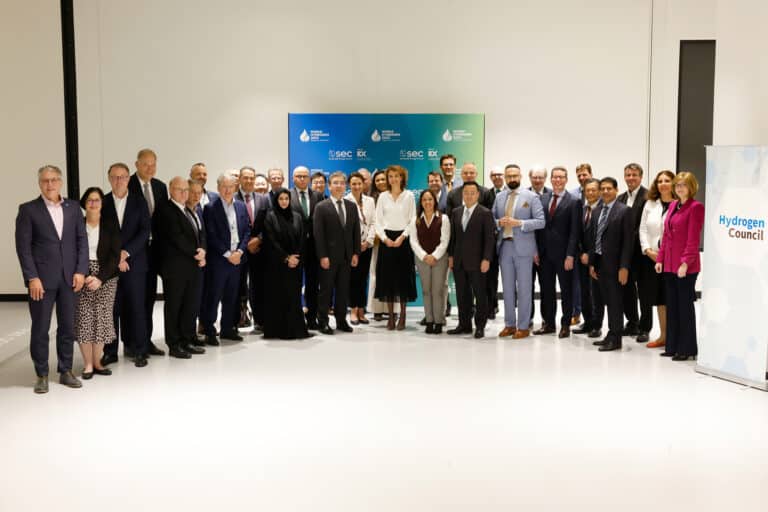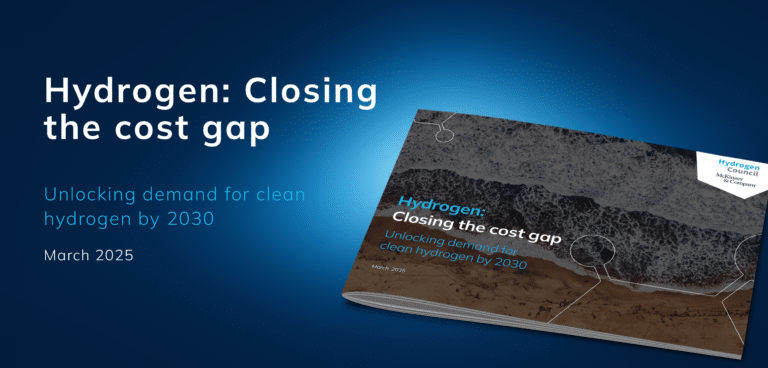ENGIE was one of 13 founding members of the Hydrogen Council when the global CEO-led initiative was created in 2017. Why did ENGIE want to be a part of the Hydrogen Council?
ENGIE is convinced that renewable and low carbon hydrogen has a major role to play as an enabler of the deployment of increasingly sustainable energy solutions. The launch of the Hydrogen Council was the testimony of our joint conviction that this new energy vector is key for the future. Together with 12 other leaders from the energy, transportation and manufacturing sectors, we shared a common vision of the significant role that hydrogen could play in bringing about a successful transition to carbon neutrality. We joined the Hydrogen Council to collectively promote this vision, mobilizing industry, investors and public decisionmakers.
What does it mean to ENGIE to be a founding member of the Council?
ENGIE is proud of being a founding member of the Council, with the conviction of having actively contributed to the creation of the international momentum around renewable and low carbon hydrogen, which we now observe. This dynamic must now continue!
Since 2017, the Council has been joined by 140 international companies. We are proud that the Council represents a strong and diverse membership across the value chain. Hydrogen has the potential to contribute over 20% of global carbon abatement by 2050. There are some challenges ahead of us, and strong private-public cooperation will be needed to unlock this carbon abatement potential of hydrogen.
More than five years have passed since the Hydrogen Council launched and the organization has grown significantly in that time. What are some of the biggest milestones achieved so far?
Five years ago, we naturally focused on pilot projects and their scaling up. Since then, we have moved forward. The Group is now actively involved in almost 100 renewable hydrogen projects, at different stages of maturity and across 10 countries.
Let’s remind that our [ENGIE’s] ambition is to be one of the main leaders in renewable hydrogen. We will therefore pursue our roadmap announced in May 2021, which is to develop by 2030, a renewable hydrogen production capacity of 4 GW, have 700km of dedicated hydrogen networks and 1 TWh of storage capacity, and manage more than 100 refueling stations
Tell us about some of the important hydrogen projects ENGIE is currently working on?
One of our strategic axes is to help industries and ecosystems to decarbonize. To achieve this, we have several renewable hydrogen projects in Europe and internationally.
- For example, in France we are developing the Masshylia project on the site of TotalEnergies La Mède refinery, which is scheduled to come into operation in 2026.
- The HyNetherlands project, in the North of the Netherlands aims to develop, build and operate one of the first large-scale industrial value chains in Europe for the production of e-methanol, combining renewable hydrogen and biogenic CO2.
- In Belgium, we are carrying out with Carmeuse and John Cockerill the Columbus project. This project aims to capture and valorize CO2 emissions from the Carmeuse plant and transform it into e-methane through a 100 MW electrolyzer.
Some of these projects have just been notified as “IPCEI” (Important Projects of Common European Interest) by the European Competition Directorate-General. This will enable them to receive national funding.
- On the international scene, we have just reached a major milestone with the start of construction of the Yuri project, one of the world’s first industrial-scale renewable hydrogen projects. The hydrogen to be produced will support Yara’s green ammonia production facility in Australia.
Our second focus is on mobility:
- We have just commissioned the first hydrogen-powered mining truck with an integrated hydrogen solution (production, compression, storage and distribution) for a platinum mine of Anglo American in South Africa. This solution to decarbonize the mining industry is replicable in other geographies and with other customers.
- We are also developing several mobility projects in France, such as HYGO in Brittany, with Michelin, or Hyport in the Toulouse Airport.
- As for infrastructure, we are on pilot projects, for hydrogen transport and storage using existing gas infrastructure. The Storengy (an ENGIE subsidiary) HyPSTER demonstrator will, from 2023, allow to test the production and storage of hydrogen in a salt cavern, on the Etrez site, also in France. The MosaHyc project, a French-German-Luxembourg transborder project, led by GRTGaz (another ENGIE Subsidiary), targets the conversion of 70km of existing network and the construction of 30km of new transport hydrogen pipes.
With regards to hydrogen, what does ENGIE have planned for 2023?
In 2023, the focus will be clearly on accelerating and implementing projects in the different industrial areas where ENGIE is already present (Europe, North and Latin America, the Middle East, South Africa, …).
We will also prepare for the future by targeting the scaling up of some of our projects to serve not only new local H2 ecosystems for use in transport, industry, and alternative fuels but also in export markets.
About The Hydrogen Council
The Hydrogen Council is a global CEO-led initiative that brings together leading companies with a united vision and long-term ambition for hydrogen to foster the clean energy transition. The Council believes that hydrogen has a key role to play in reaching our global decarbonization goals by helping to diversify energy sources worldwide, foster business and technological innovation as drivers for long-term economic growth, and decarbonize hard-to-abate sectors.
Using its global reach to promote collaboration between governments, industry and investors, the Council provides guidance on accelerating the deployment of hydrogen solutions around the world. It also acts as a business marketplace, bringing together a diverse group of 140+ companies based in 20+ countries across the entire hydrogen value chain, including large multinationals, innovative SMEs, and investors.
The Hydrogen Council also serves as a resource for safety standards and an interlocutor for the investment community, while identifying opportunities for regulatory advocacy in key geographies.
To find out more visit www.hydrogencouncil.com and follow us on Twitter @HydrogenCouncil and LinkedIn.
Joanna Sampson, Communications Manager, Hydrogen Council
joanna.sampson@hydrogencouncouncil.com



